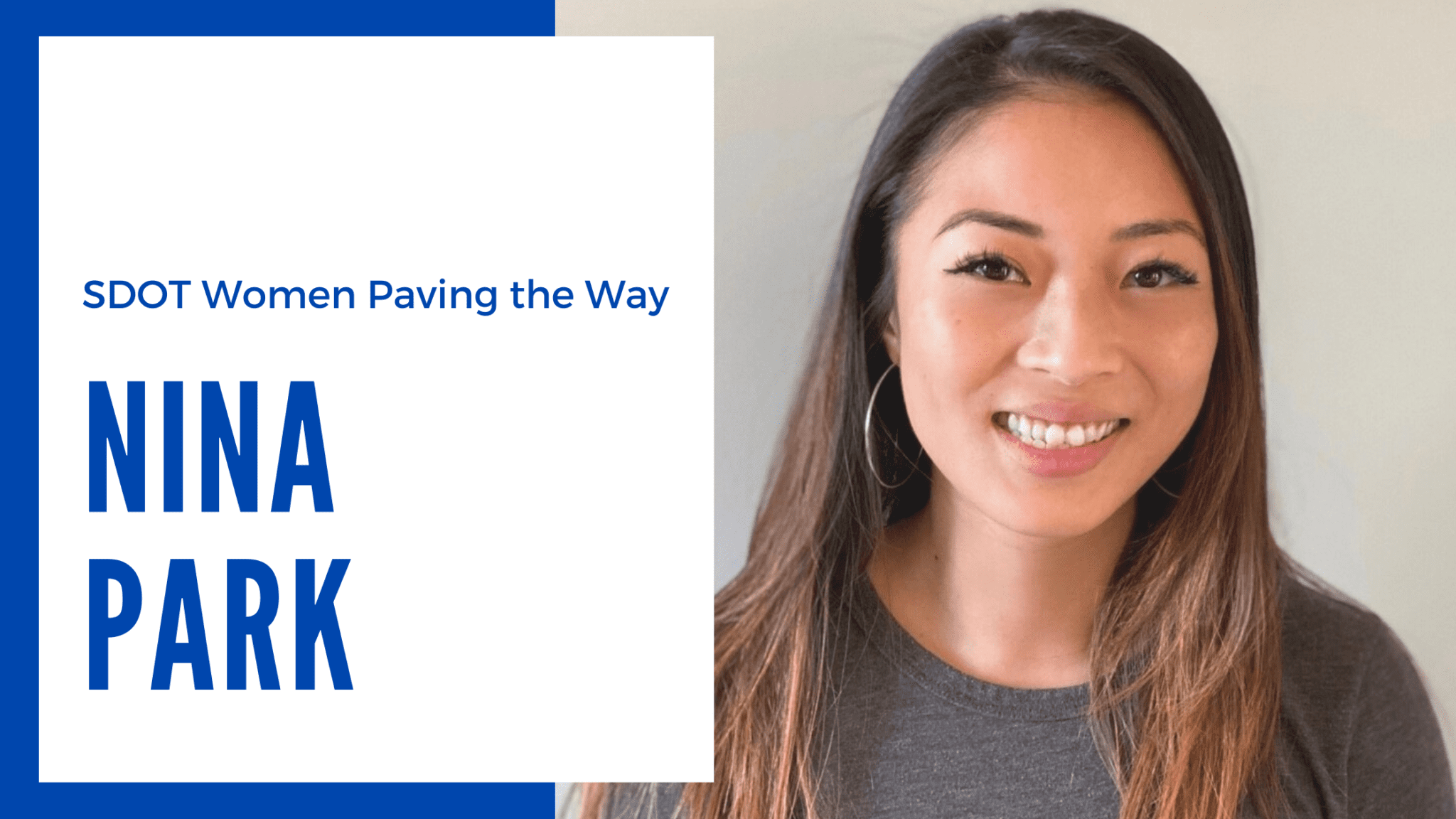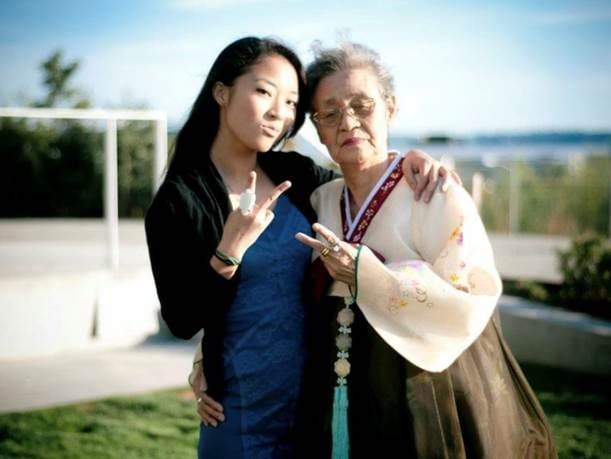
During Women’s History Month in March, we’re sharing stories of SDOT’s talented, brave, strong, and determined employees who are making our city safer, opening paths for others, and fighting for a more equitable city.
These women are building bridges and paving the way – both literally and for others in the workforce. This week, we had a virtual sit down with Nina Park.

Meet Nina Park.
If you want to be inspired, see goodness in humanity, and find hope for the future, then have a conversation with Nina Park.
Nina is one of SDOT’s amazing Executive Assistants who keeps us moving. (Seriously, where would we be without our administrative team??) Nina works with two Executive Leadership Team members: Sherysse Morris, our Director of People, Culture, and Logistics (formally known as Human Resources) and Kristen Simpson, our Chief of Staff.
Outside of the office, Nina is in graduate school at the University of Washington’s Evans School of Public Policy and Governance working towards a Master of Public Administration. She’s joining the board of the Korean American Coalition where she will work to empower the Korean American community, particularly the elders and small business owners. Nina wants to ensure that elders and the Korean community are being heard especially during this time when we’re hearing more about anti-Asian violence towards Asian Pacific Islander (API) communities. Nina also volunteers her time to support Black, Indigenous, People of Color (BIPOC) candidates running for local government by doing campaign compliance and tracking their funds.
Nina chooses to be involved in things she genuinely wants to do. And, as you’ll soon learn about, she comes from an extensive line of women who value doing their part to support the community.
Hi Nina, to start off, tell me about your job and what you love about your role at SDOT?
I support two SDOT executives and my primary role is to help them stay organized and look great! I support their portfolios and set them up for success by balancing their calendars. I think the City has a heavy meeting culture, and I help make sure they have uninterrupted time to focus on their work and time to connect with people on their teams.
I love being an Executive Assistant. It’s a role that you get what you put in, and I’ve really been able to make it what I want. The two chiefs I work with are incredibly supportive of me, my growth, and where I want to be. I started out primarily providing support, but now I’m taking ownership of more projects.
I recently began working closely with our Strategic Human Resource Director to learn more about labor, compliance, and the legal aspect that I’m familiar navigating around (prior to SDOT, I worked as a legal aid at a law firm). I’m also learning about the work of our Office of Equity and Economic Inclusion (OEEI) team. The amount of work they do to ensure equity and Race and Social Justice Initiative (RSJI) principles are incorporated, and compliant to our transportation programs are great!
Tell me about a defining moment in your career journey?
I was once told that I have a knack for logistics and big-picture thinking. My initial response to that was, “I didn’t want that to be my strength! I wanted my strength to be quantitative.”
But a defining moment came recently when I realized that I needed to celebrate my strengths – by acknowledging what my strengths are, and what they aren’t. And then, being realistic about developing the areas I wanted to become stronger in. Just because I wanted to have a quantitative mind, didn’t mean that I couldn’t hone my existing strengths while developing my quantitative skills. I’m in graduate school at the University of Washington’s Evans School of Public Policy and Governance and applying myself to strengthen my quantitative skills.
When I’m honest about my strengths, I realize what I’m doing is so much more than just calendaring and scheduling. Time is a privileged concept. It’s a critical component of getting things done and establishing an approachable brand for the execs I support.

Who is someone that you look up to, and why?
My mom오마 (pronounced: Oma), my grandma 할머니(pronounced: Halmeoni), and my aunties 이모 (pronounced: Imo)! They lived through occupation and the Korean war, and they migrated to a foreign country where they didn’t know the language or have any resources.
My mom has always been involved in community groups. She has shown and taught me that serving others is our privilege – like translating the English language for the elderly (something I’ve done since I was a young person). This has laid the foundation for why I choose to get involved with the things that I do.
I love the values my mom and grandma have passed on to me and I love knowing that whatever I do, or don’t do, they’re still going to love and support me, and be on my side. They’ve been super influential to who I am.

How do you think identifying as a woman has impacted your career?
It’s advantageous to be a woman and I think it makes us stronger. It’s one more layer and one more intersect that I understand. When one works through their challenges and barriers, they become stronger and understanding, and some people don’t have the opportunity to be challenged that way. I think the City of Seattle does an excellent job recognizing gender and racial biases.
What is the best career advice you like to share with others?
I have three pieces of advice:
- Always follow up and follow through. It’s basic trust building. When you meet someone, who offers their time to you, send that calendar appointment invite!
- Affirm, answer, and redirect. This is how I organize obstacles or concerns: Affirm the problem, answer it as best you can, and redirect to the bigger picture to align everyone again.
- Your imposter syndrome is just a conspiracy theory against yourself. Your doubts of your abilities and value are made up theories only you see. No one else feels that way about you. You are great.

Where do you want to grow your career?
I’d love to grow within the City of Seattle because I think working in local government is truly impactful. At SDOT, we have direct impact on communities and working as an Executive Assistant on two different but interconnected teams, I see two different strengths of SDOT. On the People, Culture, Logistics (HR) side, I see crew members who are on the front lines keeping our streets and sidewalks safe in all weather. And working with the Chief of Staff in the Directors Office, I work with people who are working with Council and influencing policy. The direct influence that we have over the city and community makes me want to stay and grow here.
Throughout this month we will be sharing stories of other women at SDOT who inspire us. Learn about other SDOT Women Paving the way: Meet Mildred, Karen, and Kristen.